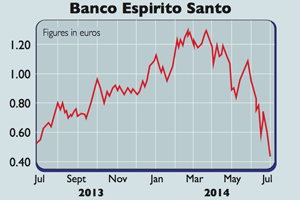Wobble sparks euro fears
Jitters over a Portuguese bank bring back memories of the worst of the eurozone crisis.

Get the latest financial news, insights and expert analysis from our award-winning MoneyWeek team, to help you understand what really matters when it comes to your finances.
You are now subscribed
Your newsletter sign-up was successful
Want to add more newsletters?

Twice daily
MoneyWeek
Get the latest financial news, insights and expert analysis from our award-winning MoneyWeek team, to help you understand what really matters when it comes to your finances.

Four times a week
Look After My Bills
Sign up to our free money-saving newsletter, filled with the latest news and expert advice to help you find the best tips and deals for managing your bills. Start saving today!
Sliding eurozone markets, fears over the solvency of banks and countries "it feels just like 2012 again", says Raoul Ruparel in Forbes.
Late last week, Banco Espirito Santo (BES), Portugal's biggest bank, saw its share price plunge when it emerged that its parent company, Espirito Santo International (ESI), had failed to pay the interest on some of its debts.
The complicated ownership structure left investors worried about the extent of BES's exposure so they sold first and asked questions later.
MoneyWeek
Subscribe to MoneyWeek today and get your first six magazine issues absolutely FREE

Sign up to Money Morning
Don't miss the latest investment and personal finances news, market analysis, plus money-saving tips with our free twice-daily newsletter
Don't miss the latest investment and personal finances news, market analysis, plus money-saving tips with our free twice-daily newsletter
As the mood soured, a Spanish bank shelved a bond auction, while a Greek government bond auction proved less successful than expected. The markets' biggest fear about the eurozone during the crisis that bust banks would in turn bankrupt their national governments had flared up again.
While Portugal's government should be able to cover BES's €920m exposure to ESI if it needs to bail it out, it "could ill afford a widespread bank rescue", reckons Capital Economics. High unemployment and the weak economy also suggest there could be more bank losses to come in future.
Yet by early this week the wobble was over. BES "is far too small to have any systemic impact itself", said Morgan Stanley's Hans Redeker, and the turmoil at the overcomplicated holding company where accounting irregularities have been discovered appears specific to this bank.

It also suggests that the European Central Bank's (ECB) year-long audit of bank balance sheets is having a positive impact. The so-called asset quality review, to be published this autumn, is supposed to allay fears that European banks (unlike their UK and US counterparts) are still hiding their losses.
The ECB reportedly told the Portuguese authorities that complex shareholdings "might be the type of thing to fall foul of its review", says Iain Dey in The Sunday Times.
If this is a result of the review, it's good news. Previous audits have been toothless, so a more convincing one would boost confidence in European banks over the long run. But it does imply further jitters in the short term as once-hidden losses see the light of day.
Get the latest financial news, insights and expert analysis from our award-winning MoneyWeek team, to help you understand what really matters when it comes to your finances.

-
 New PM Sanae Takaichi has a mandate and a plan to boost Japan's economy
New PM Sanae Takaichi has a mandate and a plan to boost Japan's economyOpinion Markets applauded new prime minister Sanae Takaichi’s victory – and Japan's economy and stockmarket have further to climb, says Merryn Somerset Webb
-
 Plan 2 student loans: a tax on aspiration?
Plan 2 student loans: a tax on aspiration?The Plan 2 student loan system is not only unfair, but introduces perverse incentives that act as a brake on growth and productivity. Change is overdue, says Simon Wilson